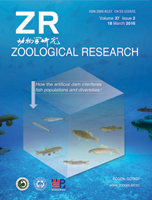
|
Zoological Research
Kunming Institute of Zoology, Chinese Academy of Sciences
ISSN: 2095-8137
Vol. 30, No. 2, 2009, pp. 158-164
|
 Bioline Code: zr09025
Bioline Code: zr09025
Full paper language: English
Document type: Research Article
Document available free of charge
|
|
|
Zoological Research, Vol. 30, No. 2, 2009, pp. 158-164
| en |
The Potential of Rat Inner Cell Mass and Fetal Neural Stem Cells to Generate Chimeras
Guo, Ji-tong; Li, Xue-feng; Shahnaz, Fida; Gou, Kemian; Nakisa, Malakooti; Zhang, Chun-fang; Morrison, John R.; Trounson, Alan O. & Du, Zhong-tao
Abstract
The rat chimera is an important animal model for the study of complex human diseases. In the present study we evaluated the chimeric potential of rat inner cell masses (ICMs) and fetal neural stem (FNS) cells. In result, three rat chimeras were produced by day 5 (D5) Sprague-Dawley (SD) blastocysts injected with ICMs derived from day 6 (D6) and D5 Dark Agouti (DA) blastocysts; four rat chimeras had been generated by D5 DA blastocyst injected with D5 SD ICMs. For the requirement of gene modification, cultured rat inner cell mass cells were assessed to produce chimeras, but no chimeras were generated from injected embryos. The potential to generate chimeras from rFNS and transfected rFNS cells were tested, but no chimeric pups were produced. Only 2 of 41 fetuses derived from D5 DA blastocyst injection with SD LacZ transfected rFNS cells showed very low number of LacZ positive cells in the section. These results indicate that DA and SD rat ICMs are able to contribute to chimeras, but their potential decreases significantly after culture in vitro (P<0.05), and rFNS cells only have the potential to contribute to early fetal development.
Keywords
Rat chimeras; Inner cell mass; Rat fetal neural stem cells; Blastocyst injection
|
| |
© Copyright 2009 Kunming Institute of Zoology, the Chinese Academy of Sciences
Alternative site location: http://www.zoores.ac.cn/
|
|
